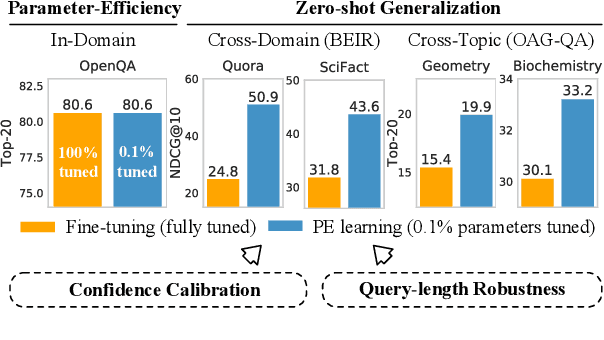Lilong Xue
Parameter-Efficient Fine-Tuning for Foundation Models
Jan 23, 2025Abstract:This survey delves into the realm of Parameter-Efficient Fine-Tuning (PEFT) within the context of Foundation Models (FMs). PEFT, a cost-effective fine-tuning technique, minimizes parameters and computational complexity while striving for optimal downstream task performance. FMs, like ChatGPT, DALL-E, and LLaVA specialize in language understanding, generative tasks, and multimodal tasks, trained on diverse datasets spanning text, images, and videos. The diversity of FMs guides various adaptation strategies for PEFT. Therefore, this survey aims to provide a comprehensive overview of PEFT techniques applied to diverse FMs and address critical gaps in understanding the techniques, trends, and applications. We start by providing a detailed development of FMs and PEFT. Subsequently, we systematically review the key categories and core mechanisms of PEFT across diverse FMs to offer a comprehensive understanding of trends. We also explore the most recent applications across various FMs to demonstrate the versatility of PEFT, shedding light on the integration of systematic PEFT methods with a range of FMs. Furthermore, we identify potential research and development directions for improving PEFTs in the future. This survey provides a valuable resource for both newcomers and experts seeking to understand and use the power of PEFT across FMs. All reviewed papers are listed at \url{https://github.com/THUDM/Awesome-Parameter-Efficient-Fine-Tuning-for-Foundation-Models}.
Parameter-Efficient Prompt Tuning Makes Generalized and Calibrated Neural Text Retrievers
Jul 14, 2022



Abstract:Prompt tuning attempts to update few task-specific parameters in pre-trained models. It has achieved comparable performance to fine-tuning of the full parameter set on both language understanding and generation tasks. In this work, we study the problem of prompt tuning for neural text retrievers. We introduce parameter-efficient prompt tuning for text retrieval across in-domain, cross-domain, and cross-topic settings. Through an extensive analysis, we show that the strategy can mitigate the two issues -- parameter-inefficiency and weak generalizability -- faced by fine-tuning based retrieval methods. Notably, it can significantly improve the out-of-domain zero-shot generalization of the retrieval models. By updating only 0.1% of the model parameters, the prompt tuning strategy can help retrieval models achieve better generalization performance than traditional methods in which all parameters are updated. Finally, to facilitate research on retrievers' cross-topic generalizability, we curate and release an academic retrieval dataset with 18K query-results pairs in 87 topics, making it the largest topic-specific one to date.
 Add to Chrome
Add to Chrome Add to Firefox
Add to Firefox Add to Edge
Add to Edge